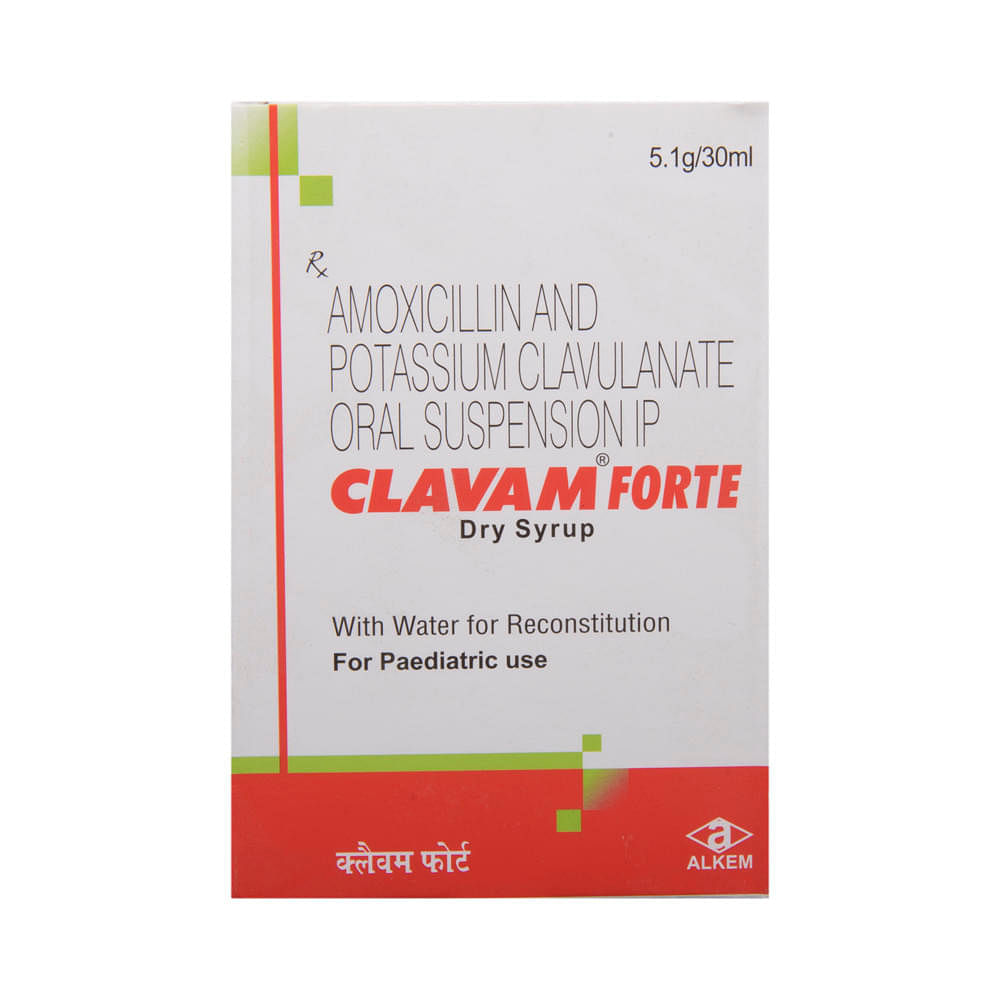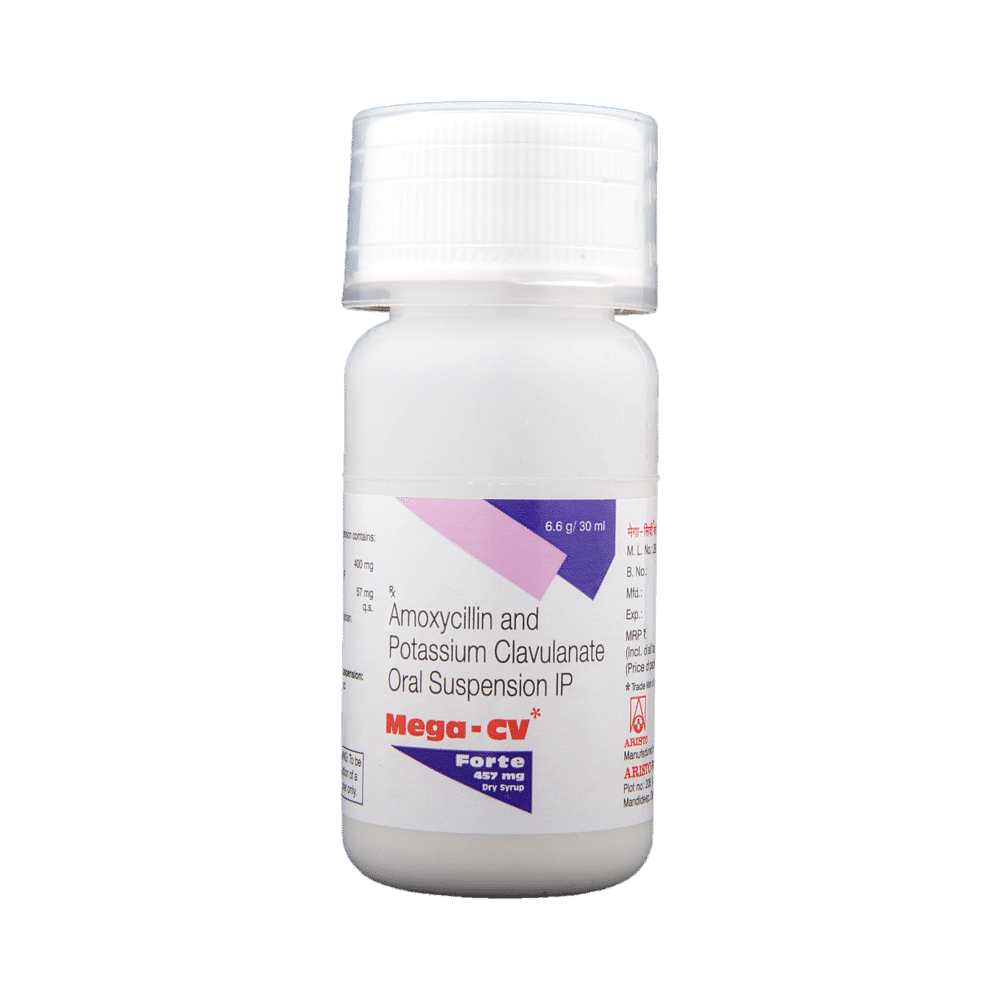
Lactaclav Forte Dry Syrup
Manufacturer
Lupitas Pharmaceuticals Pvt Ltd
Salt Composition
Amoxycillin (400mg/5ml) + Clavulanic Acid (57mg/5ml)
Key Information
Short Description
Lactaclav Forte Dry Syrup is an antibiotic medicine that helps treat bacterial infections of the ear, nose, throat, chest, lungs, teeth, skin, and urinary tract.
Dosage Form
Dry Syrup
Introduction
Lactaclav Forte Dry Syrup is an antibiotic medicine that helps treat bacterial infections of the ear, nose, throat, chest, lungs, teeth, skin, and urinary tract. It is capable of killing bacteria that have become resistant to other therapies and thus also helps treat tuberculosis that is resistant to other treatments.
Directions for Use
Your child must complete the entire course of antibiotics. Stopping too soon may cause the bacteria to multiply again or cause another infection.
How it works
Lactaclav Forte Dry Syrup is an antibiotic. It has two active agents amoxycillin and clavulanic acid. Amoxycillin works by preventing the formation of the bacterial protective covering (cell wall) essential for the survival of the bacteria. Whereas clavulanic acid serves a special purpose of inhibiting an enzyme (beta-lactamase) that is produced by resistant bacteria. This makes the combination of amoxycillin and clavulanic acid an effective line of treatment for many types of infections.
Quick Tips
Your child must complete the entire course of antibiotics. Stopping too soon may cause the bacteria to multiply again or cause another infection. Encourage your child to drink plenty of water in case diarrhea develops as a side effect. Never give Lactaclav Forte Dry Syrup until and unless prescribed by the doctor. Do not give Lactaclav Forte Dry Syrup to treat common cold and flu-like symptoms caused by viruses. Check ‘expiry’ before giving Lactaclav Forte Dry Syrup to your child. Immediately discard all the expired medicines.
Related Medicines

Clavam Forte Dry Syrup

Mega-CV Forte 457mg Oral Suspension

Curvimox CV Forte Dry Syrup

Masterclav Forte Dry Syrup

Ab-CV Forte Dry Syrup

Penhance Dry Syrup

Moxilium CV Dry Syrup

Incamox-CV DS Dry Syrup

Amoxytill CV Dry Syrup

Omclav Duo Dry Syrup
Frequently asked questions
Can other medicines be given at the same time as Lactaclav Forte Dry Syrup?
Lactaclav Forte Dry Syrup may interact with other medications or substances. It is important to inform your child's doctor about all other medications they are taking before starting Lactaclav Forte Dry Syrup. Always consult with your child’s healthcare professional regarding medication administration.
Can I get my child vaccinated while on treatment with Lactaclav Forte Dry Syrup?
Antibiotics usually do not interfere with the ingredients in vaccines or cause a reaction. However, it is recommended to hold off on vaccinating until after your child has recovered from the illness. Once your child feels better, the vaccine can be administered.
Which lab tests may my child undergo while taking Lactaclav Forte Dry Syrup on a long-term basis?
Doctors may periodically monitor kidney and liver function tests for children undergoing prolonged antibiotic therapy to assess their condition.
Can I give a higher than the recommended dose of Lactaclav Forte Dry Syrup to my child?
It is dangerous to exceed the prescribed dosage of this medicine. Higher doses may increase the risk of adverse effects. If your child experiences worsening symptoms, consult with your child's healthcare provider for re-evaluation.
Can I stop giving Lactaclav Forte Dry Syrup to my child when the symptoms are relieved?
No, do not discontinue this medication without completing the full course, even if you feel better. Symptoms may improve before the infection is completely eradicated. Continue administering the prescribed course of treatment as necessary.
Can the use of Lactaclav Forte Dry Syrup cause diarrhea?
Yes, Lactaclav Forte Dry Syrup can cause diarrhea. As an antibiotic, it eliminates harmful bacteria and may affect the beneficial bacteria in your child's stomach, leading to diarrhea. Ensure that your child drinks plenty of fluids in case of diarrhea. Consult your child's doctor if you observe prolonged or worsening diarrhea, along with signs of dehydration such as decreased urine output, dark-colored, and strong-smelling urine. Do not administer any other medications without consulting your child’s healthcare provider.
Do all viral common colds result in secondary bacterial infection?
It is uncommon for bacterial infections to follow viral infections. Giving antibiotics for a viral infection can increase your child's risk of side effects. Always consult with your child’s doctor before administering antibiotics.
The mucus coming out of my child’s nose is yellow-green. Is it a sign of a bacterial infection?
Yellow or green mucus in the nose does not necessitate antibiotic treatment. During common colds, this change is normal due to mucus thickening and color alteration. These symptoms typically last for 7-10 days.
Is there any sign which shows that my child needs immediate medical attention?
Seek immediate medical attention if your child experiences signs of serious allergic reactions (breathing difficulties, skin rashes), gastrointestinal infections (diarrhea), or liver damage (weakness, pallor, vomiting). While rare, these side effects require professional attention.


